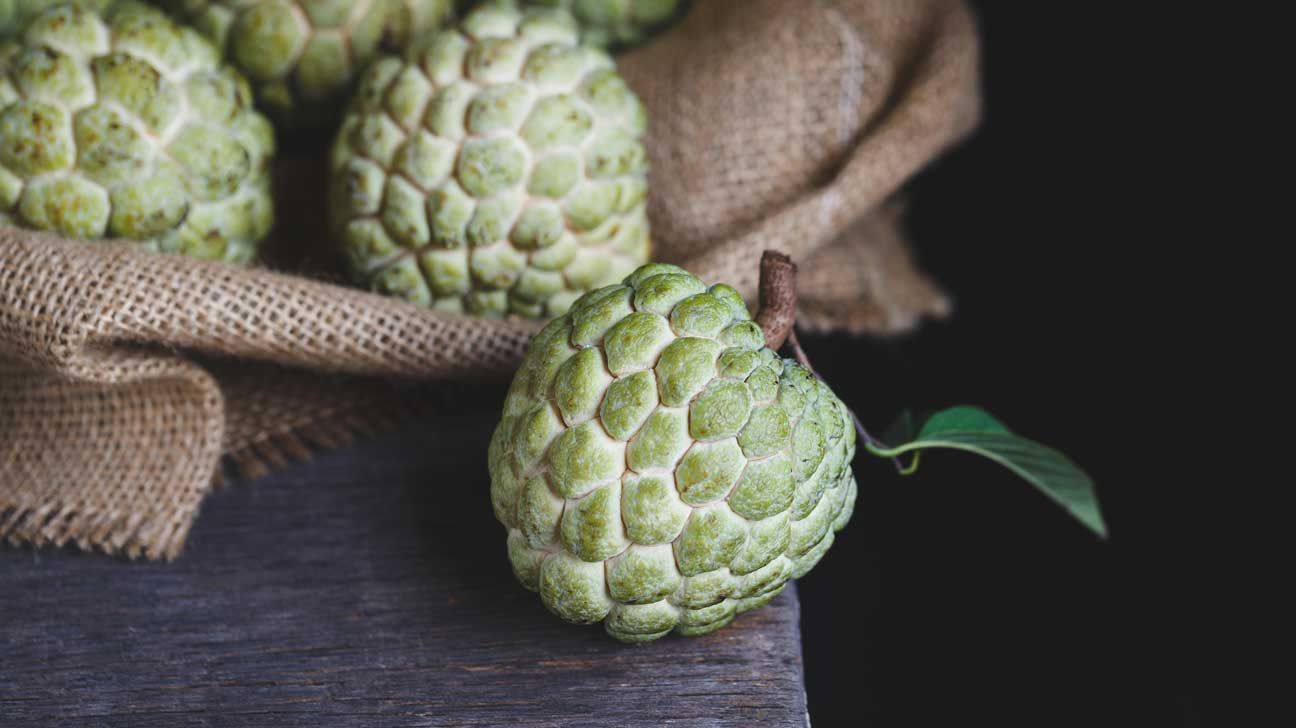8 Surprising Benefits of Cherimoya (Custard Apple)

Cherimoya, often referred to as custard apple, is a green, cone-shaped fruit with leathery skin and creamy, white flesh. This exotic fruit is native to the Andes mountains in South America but is now grown in various parts of the world. Cherimoya’s unique flavor, reminiscent of banana, pineapple, papaya, peach, and strawberry, has made it a favorite among many. But it’s not just its taste that’s remarkable. Cherimoya offers a plethora of health benefits, making it a valuable addition to your diet. In this comprehensive guide, we’ll explore eight surprising benefits of cherimoya, followed by answers to frequently asked questions about this intriguing fruit.
Rich in Nutrients
Cherimoya is packed with essential vitamins and minerals. It is particularly rich in vitamin C, providing a significant portion of your daily needs in just one serving. Vitamin C is a powerful antioxidant that helps protect your cells from damage. It also contains vitamins B6 and B1 (thiamine), vital for brain health and energy production, respectively. Furthermore, cherimoya offers a good dose of potassium, magnesium, and fiber, making it an all-around nutritional powerhouse.
Promotes Digestive Health
The high fiber content in cherimoya can aid in maintaining a healthy digestive system. Fiber helps regulate bowel movements, preventing constipation and promoting a healthy gut. Additionally, the natural sugars in cherimoya (like fructose) can act as prebiotics, feeding the good bacteria in your gut and further supporting digestive health.
Supports Heart Health
Cherimoya contains several nutrients that are beneficial for heart health. The potassium in cherimoya can help manage blood pressure levels by counteracting the effects of sodium. Additionally, its vitamin B6 content aids in controlling homocysteine levels, which, in high amounts, can lead to heart disease. The dietary fiber in cherimoya also plays a role in reducing cholesterol levels, a significant risk factor for heart disease.
Boosts Immunity
The vitamin C in cherimoya is not only an antioxidant but also boosts your immune system’s effectiveness. It enhances the production of white blood cells, which are crucial in fighting infections. Additionally, the antioxidants in cherimoya, such as vitamin C, can help reduce inflammation and protect the body against diseases.
May Have Anticancer Properties
Preliminary research suggests that cherimoya contains compounds that may have anticancer properties. These include acetogenins, which are thought to inhibit the growth of cancer cells. Although the research is still in the early stages and primarily based on laboratory studies, these findings suggest that cherimoya could be a valuable food for cancer prevention.
Supports Eye Health
Cherimoya is a good source of lutein, an antioxidant that plays a crucial role in eye health. Lutein helps protect the eyes from harmful light waves and is associated with a reduced risk of age-related macular degeneration and cataracts. Including cherimoya in your diet can contribute to maintaining healthy vision.
May Improve Mood and Reduce Anxiety
The vitamin B6 in cherimoya is essential for creating neurotransmitters, including serotonin and dopamine, which regulate mood. Adequate levels of these neurotransmitters can help improve mood and reduce symptoms of depression and anxiety. Additionally, magnesium, found in cherimoya, plays a role in controlling mood and reducing stress levels.
Can Aid in Weight Management
Despite its creamy texture, cherimoya is relatively low in calories, making it an excellent choice for those looking to manage their weight. The fiber in cherimoya can also help you feel full for longer periods, reducing overall calorie intake. Its natural sweetness can satisfy sugar cravings, making it a healthier alternative to processed sweets.
FAQs on Cherimoya
How do you eat cherimoya?
Cherimoya is best enjoyed raw. Cut it into halves, scoop out the flesh, and remove the seeds. It can be eaten on its own, blended into smoothies, or added to fruit salads.
Can you eat the skin of cherimoya?
No, the skin of cherimoya is not edible. It should be peeled off, and only the creamy flesh should be consumed.
Are there any side effects of eating cherimoya?
Cherimoya seeds are toxic if crushed open and ingested, so they should be avoided. In some people, consuming cherimoya might cause gastrointestinal upset. Start with a small amount to see how your body reacts.
How do you know when cherimoya is ripe?
A ripe cherimoya will be slightly soft to the touch, similar to a ripe avocado. It may also emit a sweet, floral fragrance.
Where can you buy cherimoya?
Cherimoya can be found in some supermarkets, especially those with a good selection of exotic fruits. It’s more commonly available in specialty or international food stores.
How do you store cherimoya?
Unripe cherimoya can be left at room temperature until it ripens. Once ripe, it can be stored in the refrigerator for a few days. Keep it in a plastic bag to retain moisture.
Can you cook with cherimoya?
While cherimoya is usually eaten raw, it can be used in cooked recipes. It makes a delicious addition to desserts, like custards and puddings. However, cooking may diminish some of its nutritional value.
Conclusion
Cherimoya, with its unique flavor and numerous health benefits, is a fruit worthy of inclusion in your diet. From supporting heart and digestive health to potentially offering anticancer properties, cherimoya is more than just a tasty treat. Remember to consume it safely by avoiding the seeds and skin, and start with small amounts if you’re trying it for the first time. Whether enjoyed on its own or as part of a dish, cherimoya is a delightful way to enrich your diet with essential nutrients and antioxidants.
- Ultimate Guide Comprehensive Review of Top Vape Mods By Vape Sourcing - April 18, 2024
- Gummy Galore: Sweet CBD Delights by Just Delta! - April 18, 2024
- Does Root Beer Have Caffeine? - April 11, 2024



